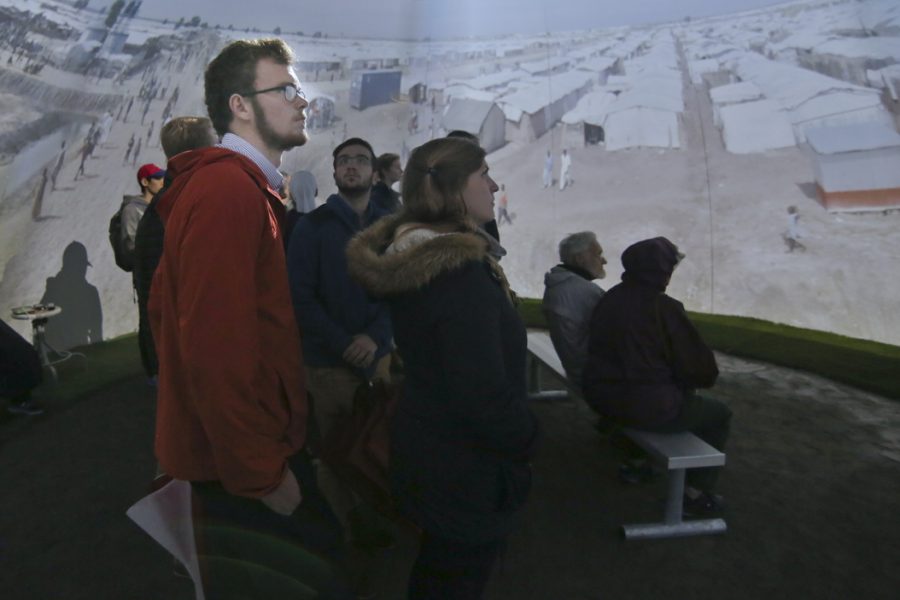While sitting in a white, under-inflated dinghy with eight other people, it seemed unlikely that up to 20 people could fit in the cramped space.
I barely had any room when it was only the nine of us sitting in the boat. But every day, dozens of such boats cross the Mediterranean Sea, full of refugees from war-torn countries.
I wasn’t actually sailing across the sea, of course, I was at the “Forced From Home” exhibit presented by Doctors Without Borders in Schenley Plaza from Oct. 27 to 31, an interactive exhibit designed to raise public awareness of the conditions of 60 million refugees around the world. A psychologist who works with the organization guided a group of us through the exhibit.
While holding a recovered life jacket that belonged to a migrant who drowned during a shipwreck and walking through replicas of tents migrants live in, I was reminded of the harsh living conditions refugees are forced to endure — and how privileged I am to be able to forget, even momentarily, about their experiences.
Despite the all-consuming nature of this year’s election, we should remember the ongoing crisis endured by people forced to flee their homes in the Middle East and elsewhere and encourage cities like Pittsburgh to grant more migrants asylum.
Despite the missing coverage in recent news cycles, the refugee crisis has not disappeared, but has become increasingly worse.
Recently, The New York Times reported that 239 migrants were killed after two separate dinghies carrying migrants from Libya to Europe sank off the Libyan coast.
Perhaps more shocking is that there have already been 4,220 deaths due to migrant drownings this year, compared to 3,700 in 2015, even though less than half the number of migrants have attempted to enter Europe during 2016 than in 2015. There are more migrant deaths than ever and the situation is worsening.
In November 2015, Mayor Bill Peduto was one of 18 mayors nationwide who signed a pledge to take in up to 500 refugees. That might not be enough. Currently, Pittsburgh is home to about 2,365 refugees, most of them are Bhutanese or Nepali, and live in the South Hills or in neighborhoods surrounding Downtown.
But despite Peduto’s pledge, Pittsburgh hasn’t played a large role in Syrian refugee acceptance — for a variety of reasons, mostly due to the fact that refugees are generally placed in areas where they’ll be near family and communities. But of the 10,000 total people that the United States has agreed to shelter, the United States, and cities like Pittsburgh, have the wealth and means to provide more.
The number of refugees entering Europe has declined due to a European Union agreement reached in March that closes down the Balkan pathway into Europe. Although this agreement may have been necessary to stabilize regions in Europe with a high influx of migrants, this has made it more difficult for migrants to cross the border.
Now that there are little, if any, viable land paths from the Middle East into Europe, more refugees and migrants are gambling with their lives and the lives of their children by attempting to make it across the Mediterranean Sea.
The only obstacle in the way of accepting more refugees is the idea that they are a threat to our security — a notion espoused by Republican nominee Donald Trump. Although some argue there is a real risk to letting in migrants from areas like Syria, where Isis still has a strong presence, the number of refugees and migrants who enter countries intending to do harm is minute and is oftentimes inflated for political purposes.
In a 2016 interview with The Washington Post, Thomas de Maiziere, the German federal minister of the interior, said that of the nearly one million migrants who have came from Syria and other parts of the Middle East, less than 100 are being investigated in connection with terrorist links. That means less than 0.1 percent of the refugees pose a potential threat, proving these misperceptions to be false. Furthermore, the State Department reported that 78 percent of the refugees admitted into the United States were women and children who are unlikely to be terrorists.
As the battle for Mosul, Iraq, intensifies, the United Nations and Doctors Without Borders estimate hundreds of thousands of people are going to be displaced.
The New York Times reported at the end of August that the United States had reached its quota of bringing in 10,000 Syrian refugees. Although this may seem like a large number, it does not compare to our intake of over 300,000 Vietnamese refugees from 1979 to 1980.
Additionally, taking in 10,000 Syrian refugees does little to help the other estimated 11 million who have been forced out of Syria since the civil war began there in 2011.
Because the current U.S. leadership is unwilling to set up safe zones in Syria and other areas of conflict, the country has a duty to provide shelter to the millions of migrants whose lives are in jeopardy.
Exhibits like “Forced From Home” remind cities like Pittsburgh — so far removed from the worsening refugee crisis — of the importance of open arms and empathy.
Going forward, we should choose to act on that knowledge.
Write to colin at [email protected].



